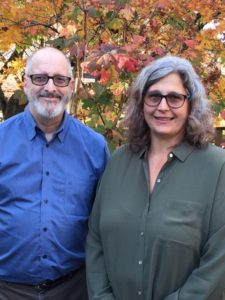Throughout the United States (Harris-Usner, 1995; Neumann, 2019) and around the world (e.g., Dixon & Welch, 2001; Zhang et al., 2018), infants, toddlers and their families in rural areas experience higher risk than those in urban areas. In a parallel fashion, rural Infant Mental Health (IMH) professionals encounter more barriers to their professional development when they live in rural areas versus urban areas; regardless of whether they live in the U.S. (Harris, 2006; Thornburg & Scott, 2006) or around the world (Hyson & Roesli, 2017).
Without professional development, there is a greater risk for rural IMH professionals to leave the area (National Rural Health Association, 2008) and to be less prepared for the service challenges they face. Yet:
“successful professional development requires recognizing the unique challenges of reaching rural areas and the cultural distinctiveness of rural communities” (Thornburg & Scott, 2006, p.14).
Professional development can take varying forms for rural IMH professionals. One is early childhood professional development registries (Funk et al., 2017; Thornburg & Scott, 2006). The most established registry is the Infant Mental Health Endorsement® (Endorsement®) developed by the Michigan Association for Infant Mental Health (MI-AIMH) in the early 2000s and now present in 30 U.S. states, Western Australia and Ireland and moving into other Australian states and Japan, under the leadership of the Alliance for the Advancement of Infant Mental Health (for more information see Funk et al., 2017 as well as www.allianceaimh.org).
In Oregon, the Oregon Health Authority (OHA), a state government department, had included money to initiate Endorsement in their funding requests. Thus, in 2015 the Oregon Infant Mental Health Association was in discussions about bringing Endorsement to Oregon. One concern in implementing the rollout of Endorsement was ensuring equity and diversity along multiple dimensions, including geographic: the rural/urban divide. A local Oregon foundation focused on rural development, The Ford Family Foundation, stepped forward and initiated the idea of providing funding to support Endorsement reaching all the corners of Oregon.
Early planning identified areas of focus including raising awareness about Endorsement throughout the state, removing barriers to initiating Endorsement for rural IMH professionals, and assisting those professionals to effectively navigate the multiple steps to achieve Endorsement. These goals led to the creation of rural success strategies. Some strategies were implemented by the statewide Endorsement Director and others by our contracted local indigenous Rural Endorsement Specialists.
Endorsement Director Strategies
Strategies provided by the central office included:
- offering scholarships for all fees associated with Endorsement,
- outreach through presentations at statewide meetings of infant and early childhood rural decision makers,
- creating Endorsement materials in Spanish and contracting with Spanish speaking staff, providing trainings at rural locations,
- providing distance-based video reflective supervision/consultation groups for rural applicants,
- holding monthly meetings of the rural IMH endorsement specialists (described below) for the purpose of mutual support, sharing strategies, and celebrating progress,
- contracting with local indigenous IMH professionals who: had lived and worked in their communities for a minimum of two years; had some initial knowledge of IMH principles and practices; and who were also active in the community outside of their work sector.
Rural Endorsement Specialist Strategies
Our local indigenous contracted Rural Endorsement Specialists delivered individualized, community targeted supports in their communities including:
- presentations at staff meetings of agencies serving infants, toddlers and their families, staffing informational tables at regional trainings for rural IMH professionals,
- providing support and advising to Endorsement applicants,
- hosting open houses about Endorsement in their rural locations where interested professionals could drop in for information,
- extending outreach and information about IMH and Endorsement during other leadership activities within their rural counties,
- formally presenting to rural groups, both groups of leaders and groups of staff (Early Head Start, Healthy Families, Public Health) on Endorsement,
- identifying available local Endorsement-related resources, and those that were missing, and
- finding and inspiring rural promoters who would advocate for Endorsement.
Hannah was one of our rural IMH Endorsement specialists. She worked as a manager for an Early Head Start in a town of about 15,000 people on the Oregon coast. Hannah summarized her greatest success in helping rural applicants move through the Endorsement-related process as:
“my ability to be flexible – meet them at their job, at lunch; meet them in the evenings – a coffee shop or at their house for one person who had kiddos. … going to where they were and meeting them in tiny little bits that they had the time.”
An unanticipated benefit was the professional development of the rural Endorsement specialists themselves. Examples of their increased leadership included:
- influencing their own agency to expand IMH services,
- increasing public speaking skills,
- deepening connections with other IMH leaders within their communities,
- developing reflective supervision skills,
- becoming the known local IMH experts in their communities,
- creating the two-minute “elevator talk” about IMH and Endorsement, and
- envisioning a professional future roadmap for themselves.
For Hannah, she reported:
“I have a tendency to want to be behind the scenes, just a worker bee. But, obviously, knowing that’s not always the thing that’s needed – so, yeah, definitely confidence-building.”
Results
Based on the definitions of our funder1, 59% of the 102 endorsees from 7/1/16 to 2/28/19 were rural professionals. By contrast, the US census reported that 29-37% of Oregon residents live in locations with less than 25,000-50,000. Thus, through our efforts rural professionals were actually overrepresented among Oregon IMH professionals who earned IMH Endorsement®.
Implications
- Rural participation in professional development initiatives, whether in IMH or not, can be increased with a systematic outreach strategy and this can be documented. Many initiatives intended to be universal do not track rural versus urban participation, and rarely do any special outreach to rural individuals.
- Creating and implementing a systematic approach to an initiative. Five possible barriers to a rural IMH professional were addressed with at least one of our strategies:
-
- Awareness was increased through having Endorsement information distributed by statewide IMH organizations, staffing informational tables and presenting at statewide and regional gatherings of IMH leaders and staff, and identifying and inspiring rural champions who would advocate for Endorsement® (e.g. early childhood college faculty to their students, mental health consultants to their consultees at Head Starts).
- More in-depth education was provided at presentations at local IMH agencies by our Rural Endorsement Specialists, hosting Endorsement open houses in rural locations, and creating Endorsement informational materials in Spanish.
- Helping rural professionals over the hump of registering and initiating an Endorsement application was achieved through offering scholarships to offset registration and application fees, offering phone support from central office and Rural Endorsement Specialists about how to initiate an applications, and hosting rural open houses to provide information on how to apply. Computer skills are required to complete an application, as well as access to reliable internet, both of which can be challenges in rural communities.
- Support, advice, and encouragement was provided over the phone and in-person by our Rural Endorsement Specialists both to individual applicants and in groups.
- Distance-based video group reflective supervision was essential for applicants who needed more reflective supervision hours and for whom it was not available in their communities, which was often true in rural locations.
- IMH organizations looking to enhance their rural outreach might broaden their focus for obtaining support to foundations looking to support rural development in their state. Our funder was a foundation whose overriding mission was not IMH but rather rural development, although they had an area of interest in early childhood.
- As we were rolling out our strategies, we often were not sure how they might need to be adjusted midstream to fit the community of rural IMH professionals we were trying to reach and help. Our funder was very supportive and accommodating in understanding the need for flexibility and creativity in outreach to rural communities. There was a wonderful parallel process – our funder’s flexibility empowered us to be flexible and encourage creativity for our Rural Specialists in identifying the unique barriers and strategies needed with each rural community, and with each rural applicant. This is an important implication for funders looking to support rural initiatives.
- Many publications have talked about the isolation of rural professionals (e.g., Harris-Usner, 1995). An implication is the risk of this for Rural Endorsement Specialists. Thus, we felt it was critical to provide support to them through monthly video conference calls, and quarterly in-person meetings with team building and reflective activities, with an emphasis on empowering and sharing their ideas to overcome hurdles. Hannah commented, “I always left (these meetings) feeling a kind of renewed purpose and I always got information that was helpful to me to kind of adjust things or just keep going.” We also provided immediate access to technical assistance when they were advising rural applicants, so that meeting time and the long travel time was not wasted because someone could not log in or navigate a glitch in the electronic system.
The hiring of these Rural Endorsement Specialists did not occur as it might in an urban setting. We found we couldn’t just post a job announcement and expect applicants. It was important to travel and meet with rural IMH leaders to brainstorm who locally might a good candidate to approach and invite to apply. We also had to be flexible with work definitions and requirements; we split a job to a job share in one instance and realigned two counties as we learned about geographic travel barriers.
- Community is required to attend IMH-oriented continuing education and receive ongoing reflective supervision annually to maintain their Endorsement status. Creating a community of rural IMH Endorsed professionals is challenging. We have to continue to tailor the IMH trainings provided so that they can be accessed on the web or in locations around the state. Continued access to distance-based video group reflective supervision will be essential.
Future research
Future research would aim to:
- Establish which of the strategies we used that made the most difference in the large number of rural Endorsees;
- Look at rural applicants who did not complete their Endorsement and identify the barriers they face, with a view to develop new strategies to address those barriers; and
- Research how generalizable our strategies are to rural areas in other states in the United States and in other countries.
Increasing rural participation in IMH professional development initiatives is clearly now possible. We hope our findings will inspire more organizations to initiate systematic outreach efforts to include rural IMH professionals. We welcome requests for more information at either redmondreamsphd@gmail.com and/or paigelightlpc@comcast.net.
Notes
1 The Ford Family Foundation defined a rural professional as working in a city of less than 35,000 and their city is not contiguous with a city of more than 35K (i.e., a suburb of a larger city), OR as working for an agency in an urban city, however, more than 60% of their caseload is rural.
References
Dixon, J. & Welch, N. (2001). Research the rural-metropolitan health differential using the ‘social determinants of health’. Australian Journal of Rural Health, 8, 254-260. https://doi.org/10.1046/j.1440-1584.2000.00327.x.
Funk, S., Weatherston, D., Warren, M., Schuren, N., McCormick, A., Paradis, N. & Van Horn, J. (2019). Endorsement®: A national tool for workforce development in Infant Mental Health. Zero to Three, 39(3), 50-57.
Harris, D. (2006). Rural revisited: A decade-and-a-half of practice. Zero to Three, 26 (4), 22-29.
Harris-Usner, D. (1995). Old threads, new patterns: Reaching out to rural families. Zero to Three, 15 (5), 1-9.
Hyson, M., & Roesli, R. (2017) Connecting the dots: Learning communities for village teachers in rural Indonesia. Young Children, 72(4), 35-42. https://www.naeyc.org/resources/pubs/yc/sep2017/connecting-dots-indonesia.
National Rural Health Association (2008). Rural behavioral health. Recruitment and retention of Quality Health Workforce in Rural Areas: A Series of Policy Papers on the Rural Health Careers Pipeline; Paper #5. Retrieved from https://www.ruralhealthweb.org/getattachment/Advocate/Policy-Documents/WorkforceRuralBehavHealth.pdf.aspx?lang=en-US.
Neumann, S. (2019). Growing Up Rural in America: U.S. Complement to the End of Childhood Report 2018. Retrieved from https://www.savethechildren.org/content/dam/global/reports/2018-end-of-childhood-report-us.pdf.
Thornburg, K. & Scott, J. (2006). Approaches to rural professional development. Zero to Three, 26 (4), 14-21.
Zhang, S., Dang, R., Yang, N., Bai, Y., Wang, L., Abbey, C., and Rozelle, S. (2018). Effect of caregiver’s mental health on early childhood across different rural communities in China. International Journal of Environmental Research and Public Health, 15, 1-25. doi:10.3390/ijerph15112341.

Authors
Redmond Reams (USA) and Paige Light (USA)








